David Powell - a life less ordinary
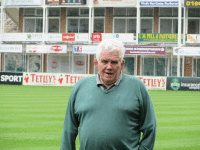
Few sporting partnerships last fifty-five years, so it is inevitable that David Powell has seen plenty of change during his association with Northampton Saints Rugby Club.
Whilst David would admit to being something of a traditionalist, he has also played the role of moderniser at the club, pioneering some of the great developments in rugby groundsmanship.
"I came to Saints as a player, before going on to play for England and the British Lions. But, at heart, I am a farmer," he explains. "Growing grass on a pitch is no different to growing grass to fatten livestock or establishing crops - good husbandry is the principle."
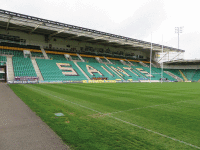
"The stadium was a mess - sheep had been grazed on the pitch in the summer, and one side was a quagmire. The training pitches were barely playable - just about park standard," he recalls.
Calling on his agricultural experience, he realised that improving drainage would be key, as the underlying soil was very compacted. Working with a local drainage contractor, year on year the pitch improved.
"The club was becoming more successful and, with the growing television coverage of rugby, standards needed to be ever higher," David comments. "The original pitch was just a soil pitch, so we introduced sand, and later fibre, which improved the surface drainage. But then, as more modern spectator stands were erected, there was the issue of shading to deal with too."
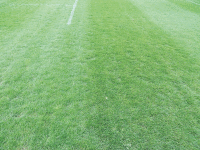
The drainage system still follows the traditional construction of gravel drains over pipe at 5m, with sand slits added, initially at two metre centres, then at one metre.
Keen eyed visitors to the side of the stadium may spot an effectively subterranean lake beneath the Burrda Stand, and this is a vital part of the infrastructure.
"A pump sump in the corner of the stadium, designed by sportsfield drainage specialist, James Pugh Lewis, takes all drainage water from the pitch into the lake where it is stored, alongside all the rainwater from the roofs and car parks. It can then be used for irrigation as required," David explains.
The system is so effective that, at Easter 1998, when Northampton's St James district was devastated by flooding, the pitch was dry. The match still unfortunately had to be cancelled as the local roads were impassable!
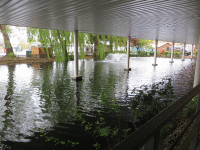
The irrigation system is virtually automatic, although three mobile fountains are used in the middle of the pitch so that they can be moved about to take account of drift in the windy environment of the stadium. "Because the water comes from our own lake, it is at minimal cost," points out David.
Catering for harsh winters is equally important, and David has worked closely with Nigel Felton of Sports and Stadium Services to develop a dome pitch covering system to keep the frost and rain out.
David admits that his approach to machinery is 'agricultural' and that he does not understand the move towards only using pedestrian equipment in stadia.
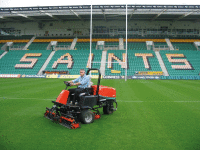
The Soil Reliever was deployed to the club with a Deutz Agroplus tractor as part of an RFU scheme and later came into the club's possession. "The Deutz is shod on turf tyres and does all the heavy work, but we also have a Kubota ST36 for spiking, topdressing and surface work."
He describes the Jacobsen triple mower as 'very reliable', and it needs to be, mowing four pitches and the training areas every day in the growing season.
Fertiliser is supplied in bulk bags and David believes in using straights to supply the required nutrition. "I've been growing grass for sixty years, so I don't need to do a lot of soil tests or analysis. I work closely with an agricultural agronomist and you won't find me buying little bags of expensive mixtures. In my consultancy work, I see a lot of pitches that are starved, but just need a good application of basic fertiliser."
David is also sceptical of grass seed suppliers' claims for the latest grass varieties that grow emerald green swards all year round.

He points out that, whilst the Franklin's Gardens stadium pitch is seeded with a premium mix, and the training pitches a lower cost mixture, it is hard to see the difference between the two.
David comments that the club benefits from being self-contained in its own grounds with ample space and parking, but gets plenty of support from the local community and businesses.
"The stadium is at the centre of everything - from the players' award ceremony held in a marquee on the pitch in May, to the semi-final play-offs, which followed immediately after. We then had a concert to say farewell to the old Sturridge Pavilion, before the pitch was koroed off ready to be relaid for the new season."
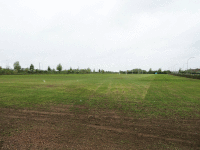
Saints have recently appointed his successor, and David intends to remain firmly in the background during the handover.
"We had a lot of applications for the post, and we were looking for someone at the start of his career, who wanted to have a patch of his own - that's the nature of this job."
"We have appointed Wayne Billing, who was previously Head Groundsman at the Tottenham Academy, and I expect that he will want to make a few changes, possibly including pedestrian mowers! I'll stick around to support him, but ultimately it will be down to him."
"I may have traditional views, but have seen a lot of change at Saints, and believe that it has led to ever-improving standards."
